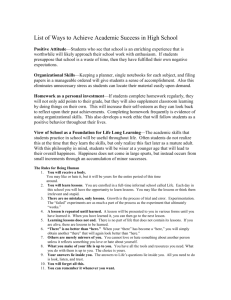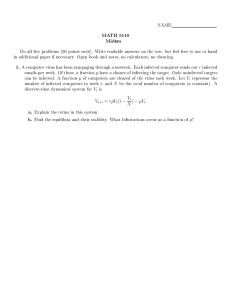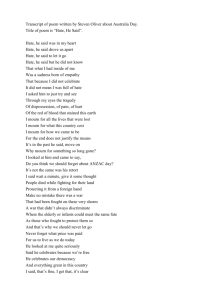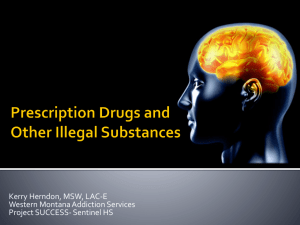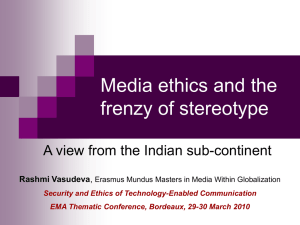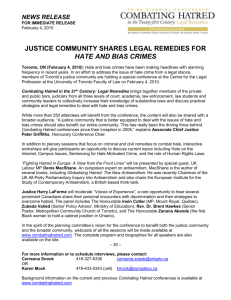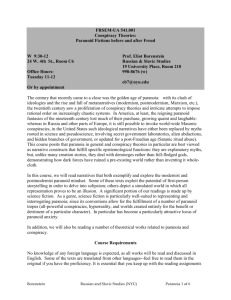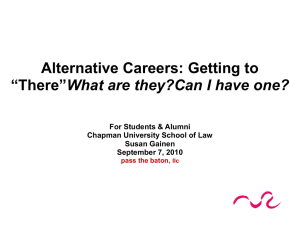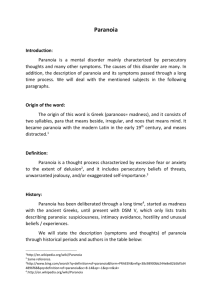Wk 9 - Hanford
advertisement
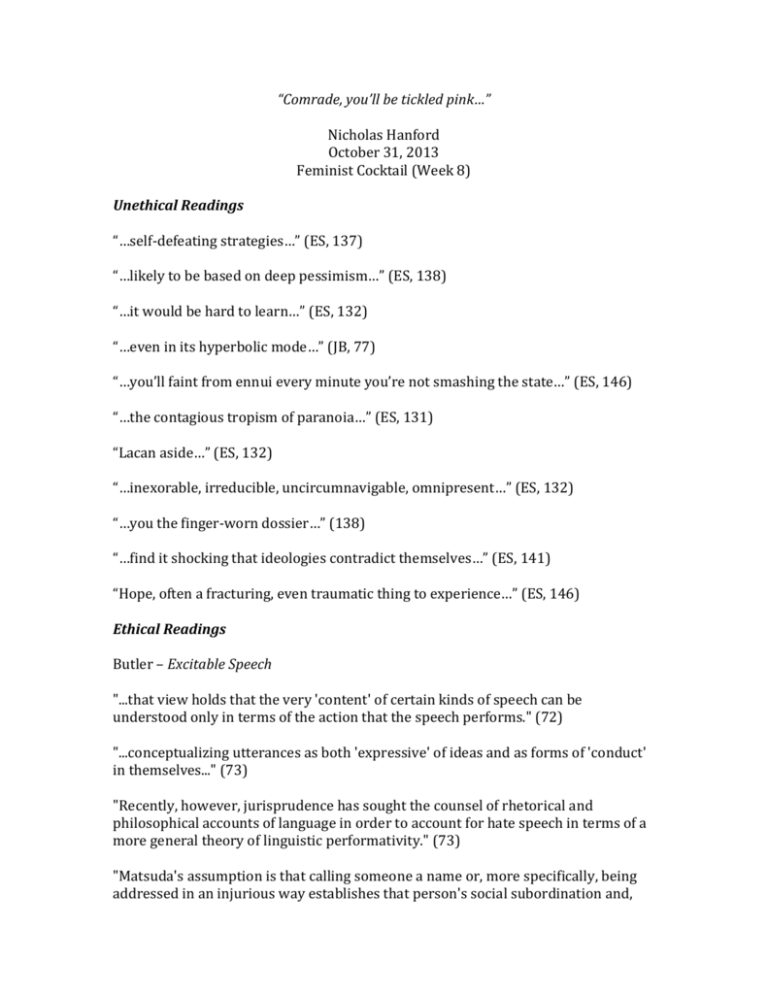
“Comrade, you’ll be tickled pink…” Nicholas Hanford October 31, 2013 Feminist Cocktail (Week 8) Unethical Readings “…self-defeating strategies…” (ES, 137) “…likely to be based on deep pessimism…” (ES, 138) “…it would be hard to learn…” (ES, 132) “…even in its hyperbolic mode…” (JB, 77) “…you’ll faint from ennui every minute you’re not smashing the state…” (ES, 146) “…the contagious tropism of paranoia…” (ES, 131) “Lacan aside…” (ES, 132) “…inexorable, irreducible, uncircumnavigable, omnipresent…” (ES, 132) “…you the finger-worn dossier…” (138) “…find it shocking that ideologies contradict themselves…” (ES, 141) “Hope, often a fracturing, even traumatic thing to experience…” (ES, 146) Ethical Readings Butler – Excitable Speech "...that view holds that the very 'content' of certain kinds of speech can be understood only in terms of the action that the speech performs." (72) "...conceptualizing utterances as both 'expressive' of ideas and as forms of 'conduct' in themselves..." (73) "Recently, however, jurisprudence has sought the counsel of rhetorical and philosophical accounts of language in order to account for hate speech in terms of a more general theory of linguistic performativity." (73) "Matsuda's assumption is that calling someone a name or, more specifically, being addressed in an injurious way establishes that person's social subordination and, moreover, has the effect of depriving the addressee of the capacity to exercise commonly accepted rights and liberties within either a specific context...or within the more generalized context of the national public sphere." (75) "Here an act of speech in which a sexual intention is stated or implied becomes oddly indissociable from a sexual action." (76) "My concern is not only with the protection of civil liberties against the incursion of the state, but with the peculiar discursive power given over to the state through the process of legal redress." (77) "I mean only that the category cannot exist without the state's ratification..." (77) "The problem, then, is not that the force of the sovereign performative is wrong, but when used by citizens it is wrong, and when intervened upon by the state, it is, in these contexts, right." (77) "Diffused throughout disparate and competing domains of the state apparatus, and through civil society in diffuse forms as well, power cannot be easily or definitively traced to a single subject who is its 'speaker,' to a sovereign representative of the state." (78) "Thus, the law requires and facilitates a conceptualization of injury in relation to a culpable subject, resurrecting 'the subject' ... in response to the demands to seek accountability for injury." (78) "...the political problem is cast as the tracing of the harms as it travels from the speaker to the psychic/somatic constitution of the one who hears the term or to whom it is directed." (80) "...producing at that moment the linguistic occasion for an imagined relation to an historically transmitted community of racists." (80) "Figuring hate speech as an exercise of sovereign power implicitly performs a catachresis by which the one who is charged with breaking the law (the one who utters hate speech) is nevertheless invested with the sovereign power of law. What the law says, it does, but so, too, the speaker of hate." (81) "The speech of the addressee no longer has the power to do what it says, but always to do something other than what it says...or to mean precisely the opposite of what it intends to mean.” (82) "This is what some would call a performative contradiction: an act of speech that in its very acting produces a meaning that undercuts the one it purports to make." (84) "...for speech is taken to be a sign of agency..." (84) "Hence, one of the problems with pornography is that it creates a scene in which the performative dimension of discourse runs counter to its semantic or communicative functioning." (84) "...pornographic representation discredits and degrades those whom it depictsmainly women-such that the effect of that degradation is to cast doubt on whether the speech uttered by those depicted can ever be taken to mean what it says." (85) "This seems to be the very project in which Habermas and others are engaged-an effort to devise a communicative speech situation in which speech acts are grounded in consensus where no speech act is permissible that performativity refutes another's ability to consent through speech." (86) On equivocity of the utterance - "the very words that seek to injure might well miss their mark and produce an effect counter to the one intended" (87) - There is an echo of this within Sedgwick, quoted later. "For if one always risks meaning something other than what one thinks one utters, then one is, as it were, vulnerable in a specifically linguistic sense to a social life of language that exceeds the purview of the subject who speaks." (87) "We are no longer considering what constitutes hate speech, but, rather, the broader category of what constitutes a reasonable criteria by which protected speech is to be distinguished from unprotected speech." (88) "...performative contradiction is crucial to the continuing revision and elaboration of historical standards of universality proper to the futural movement of democracy itself." (90) "In this instance and through this strategy of relying on established conventions of universality, do we unwittingly stall the process of universalization within the bounds of established convention, naturalizing its exclusions, and preempting the possibility of its radicalization?" (90) "...one who is excluded from the universal, and yet belongs to it nevertheless, speaks from a split situation of being at once authorized and deauthorized." (91) "...both contend that political participation requires the ability not only to represent one's intention in speech but to actualize one's intention through the act of speech." (92) "That the utterance can be turned, untethered from its origin, is one way to shift the locus of authority in relation to the utterance." (93) “That discourse itself proliferates as the repeated enunciation of the prohibitive law suggests that its productive power depends upon its break with an originating context and intention, and that its recirculation is not within the control of any given subjects.” (94) “Hate speech is a kind of speech that acts, but it also referred to as a kind of speech that acts and, hence, as an item and object of discourse.” (95) “And yet, the speech of the law is considered to be resignifiable beyond any limit: the law has no single or essential meaning; it can be redirected, reserviced, and reconstructed; its language, though harmful in some contexts, is not necessarily harmful, and can be turned and redirected in the service of progressive politics. Hate speech, however, is not recontextualizable or open to a resignification in the way that legal language is.” (99) "...whether written in his text or cited here, has another connotation..." (100) - Such a short phrase, but so much! “To give the task of adjudicating hate speech to the state is to give that task of misappropriation to the state.” (101) “There is no possibility of not repeating.” (102) Sedgwick – Touching, Feeling “I suppose this ought to seem quite an unremarkable epiphany: that knowledge does rather than simply is it is by now very routine to discover.” (124) “If paranoia reflects the repression of same-sex desire, Hocquenghem reasoned, then paranoia is a uniquely privileged site for illuminating not homosexuality itself, as in the Freudian tradition, but rather precisely the mechanisms of homophobic and heterosexist enforcement against it.” (126) “Given that paranoia seems to have a peculiar intimate relation to the phobic dynamics around homosexuality, then, it may have been structurally inevitable that the reading practices that became most available and fruitful in antihomophobic work would often in turn have been paranoid ones.” (127) “That is to say, once again: for someone to have an unmystified view of systemic oppressions does not intrinsically or necessarily enjoin that person to any specific train of epistemological or narrative consequences.” (127) “The first imperative of paranoia is There must be no bad surprises, and indeed, the aversion to surprise seems to be what cements the intimacy between paranoia and knowledge per se, including both epistemophilia and skepticism.” (130) “…paranoia requires that bad news be always already known.” (130) “Paranoia seems to require being imitated to be understood, and it, in turn, seems to understand only by imitation. Paranoia proposes both Anything you can to (to me) I can do worse, and Anything you can do (to me) I can to first – to myself.” (131) “But, for example, in this post-Lacnian tradition, psychoanalytic thought that is not in the first place centrally organized around phallic ‘sexual difference’ must seemingly be translated, with however distorting results, into that language before it can be put to any other theoretical use.” (133). - Why revert back to previous ideas in order to contextualize in a way? Is this an issue of disciplinarity where anything within the psychoanalytic realm has to go back to this point? Or, is this a statement on the sexist patriarchy and the importance of reflecting that within a given theory? “An affect theory, is, among other things, a mode of selective scanning and amplification.” (135) “Allow each theory its own…” (138) - This would ordinarily fall into the ‘unethical readings’ section of my explication, but I want to unpack it a bit and that section is for short, shitty, decontextualized things that I find interesting or funny. If we end this statement prior to an ellipses, I think we see something incredibly important within theory. First of all, “each theory” puts these as distinct and singular objects that need to be taken as such. Secondly, ‘its own’ shows the necessity of keeping theories within their own contexts and denying a manifest destiny of theory. If we’re going to pick up a theory and place it somewhere not ‘its own,’ there is a requirement by the writer to recontextualize. This is something that I’ve harped on before, but its one of the main issues I have seen all over media and cultural studies (particularly within criticism texts) for several years. “‘The modern liberal subject’…Where are all these supposed modern liberal subjects?” (139) “Does it matter when such projects misdescribe themselves or are misrecognized by readers? I wouldn’t suggest that the force of any powerful writing can ever attain complete transparency to itself, or is likely to account for itself very adequately at the constative level of the writing.” - This reminds me of a point Butler was making when discussing the difficulties in transmissions of meaning through language.
